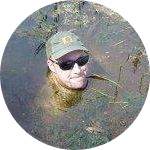About This Project
Due to sea-level rise, prolonged intrusion of seawater into freshwater ecosystems which can alter the soil carbon balance and soil structure of organic rich peat soils. Often this results in the collapse of peat converting wetlands to open water ecosystems. In this study, we will collect porewater and surface water samples from Everglades National Park and analyze these samples for physical and nutrient parameters to determine benthic metabolic shifts as a result of seawater intrusion.
Ask the Scientists
Join The DiscussionWhat is the context of this research?
We formulated this project to determine how sea-level rise and the subsequent inundation of seawater can alter freshwater wetland soil structure and chemistry. Wetlands provide a critical biogeochemical link between marine and terrestrial ecosystems by serving as a critical source of carbon and nutrients to the marine ecosystems which support productivity and biodiversity.
As sea-level rise causes freshwater wetlands to change, freshwater marshes give way to open water by rapid subsidence (loss of elevation). This subsidence is due to a dramatic shift in the soil carbon balance and soil structure resulting in a "collapse" of peat. This collapse results in a loss of wetlands and ecosystem functions. Furthermore without the organic soils we lose the source of carbon and sink of sediment.
What is the significance of this project?
The results of the study will help predicting changes in soil nutrient dynamics due to high frequency of saltwater intrusion into freshwater habitats. Using data from this study we will be able to simulate what will happen when sea level rise will cause more frequent saltwater intrusion events. This study also provides a greater understanding of how sea-level rise and saltwater transgression events can affect freshwater wetland form and function. A secondary goal is to use our data to provide guidance on how systems may recover due to short term transgression events (e.g. hurricane, high seasonal tides, etc.) and how humans can manage these processes for wetland benefit.
What are the goals of the project?
This project has two main goals:
(1) We want to characterize porewater biogeochemical interactions along a salinity gradient within the Everglades ecosystem to evaluate benthic metabolism and nutrient regeneration.
(2) We want to determine if seasonality as indicated by up-stream flow will shift benthic metabolism pathways or retard nutrient regeneration.
To achieve these goals, samples will be collected at three locations along a salinity gradient extending from freshwater to brackish/coastal marsh within Everglades National Park. Samples will be collected during the mid wet-season (the freshwater dominated) period, between wet and dry seasons (the transition period) and during the mid dry-season (seasonal high tide/saline water dominated) period.
Budget
$3,000 for porewater and surface water sample analysis from three locations during three sampling events.
$1,500 for sampling consumables which include sample bottles, acid for preservation, coolers and ice (dry or wet).
$500 for shipping and travel assistance. Samples will be transported to a certified analytical laboratory for analysis. Samples will either be shipped on ice or transported by hand.
I believe that scientists have a moral obligation to effectively communicate to the public, since a large portion of the existing funding is provided largely through public funding programs. By using crowd-sourcing everyone can contribute to the project and track the project's results in real-time rather than waiting for a manuscript to be published several years after the project is completed. This real-time tracking and involvement can also spur new ideas and collaborations.
Endorsed by
Meet the Team
Paul Julian
Paul is a PhD student at the University of Florida in the Soil and Water Science Department. Paul holds a B.S. in Biochemistry from Benedictine College and a M.S. in Environmental Science from Florida Gulf Coast University. He also works for the Florida Department of Environmental Protection with the Everglades restoration group providing technical support on project planning and permitting, science and policy. His previous work experience include water quality monitoring, harmful algal oceanographic research, plan pathogen molecular and genetic research and wildlife ecology.
When not working or studying, Paul is out and about exploring the various ecosystems of Florida with his wife and two dogs, either hiking (or wading) through cypress swamps or snorkeling/scuba diving the coastal waters.
Project Backers
- 11Backers
- 5%Funded
- $204Total Donations
- $18.55Average Donation

